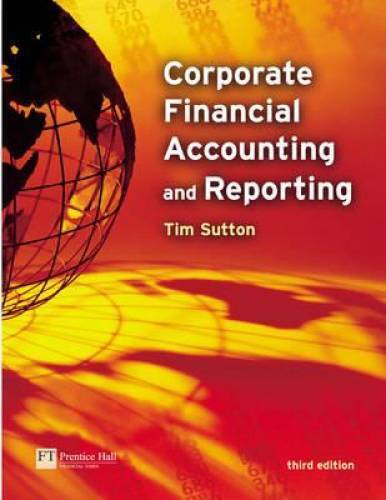Acquisitions and disclosures: financial disclosures Unilever, the giant Anglo-Dutch food and consumer products company, made major acquisitions
Question:
Acquisitions and disclosures: financial disclosures Unilever, the giant Anglo-Dutch food and consumer products company, made major acquisitions and disposals of businesses in 2000 and 2001. Key cash flow statement information for both years is given below (amounts in A million).
460 PART 2 • THE HOUSE OF ACCOUNTING 2001 2000 Cash flow from operating activities 7,497 6,738 Interest payments (net of financial income) (1,805) (760)
Taxation (2,205) (1,734)
Capital expenditures and financial investment (1,358) (1,061)
Acquisitions and disposals 3,477 (27,373)
Dividends paid on ordinary share capital (1,420) (1,365)
Cash flow before financing and treasury operations 4,186 (25,555)
Financing and treasury operations (3,992) 25,366 Increase (decrease) in cash in year 194 (189)
Unilever’s biggest acquisition was in October 2000. It paid A23.6 billion in cash for Bestfoods, a US food products company. In 2001 it raised almost A2 billion from the sale of Bestfoods’ bakery businesses (and other businesses acquired in 2000 and held for resale) and A1.65 billion from the disposal of group companies. Details of the Bestfoods acquisition in 2000 and the disposal of group companies in 2001 are set out in Exhibit 14.16. They are taken from the notes to Unilever’s 2000 and 2001 accounts.
Unilever uses the purchase method to account for acquisitions. Prior to 1998, it wrote off against reserves goodwill arising on acquisitions. Since 1998, the company capitalises goodwill and amortises it over 20 years.
Required
(a) What was the carrying amount – in the books of Bestfoods – of the net assets Unilever acquired in 2000?
(b) What was the main reason for the negative accounting policy adjustment of a1.1 billion to Bestfoods’
intangible assets?
(c) Unilever paid a23.6 billion in cash for Bestfoods but the price of the business was a26.1 billion.
How did it finance the difference?
(d) Unilever revalued ‘acquired businesses held for resale’ at the time of Bestfoods’ acquisition. What would have been the effect on its accounts – in 2000 and in 2001 when it sold them – if it had not done so?
(e) Show in summary form the effect on Unilever’s 2001 accounts of the businesses it sold that year.
Account for ‘net assets sold’ as one item. Use a journal entry or the balance sheet equation.
AppenedixLO1
Step by Step Answer:






